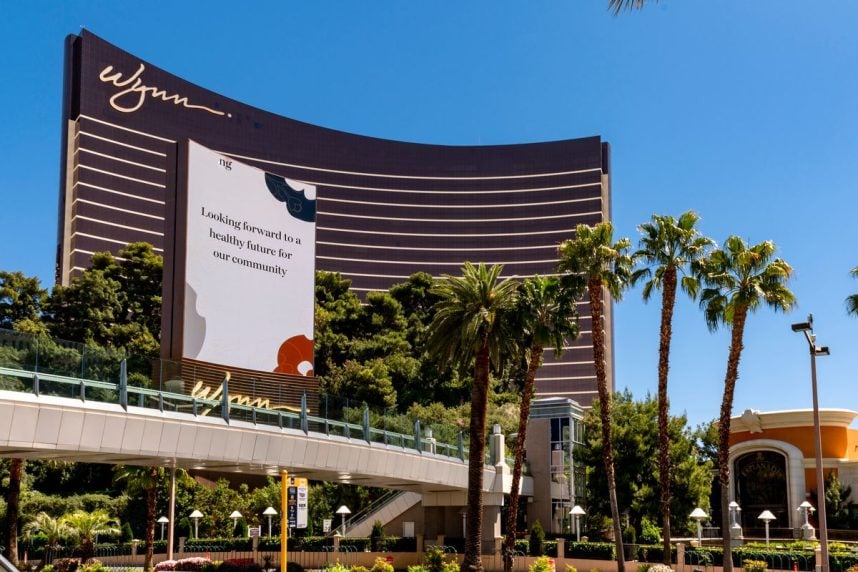Wynn Las Vegas Strikes $130M DOJ Settlement, Largest Fine Ever for a US Casino
Posted on: September 6, 2024, 07:36h.
Last updated on: September 6, 2024, 07:36h.
The Department of Justice (DOJ) and Wynn Resorts (NASDAQ: WYNN) announced late Friday that the gaming company’s Wynn Las Vegas unit agreed to forfeit $130.13 million to the government to settle claims the casino operator worked with unregulated money transfer enterprises to shift capital for the benefit of the company.

The fine, which is part of a non-prosecution agreement (NPA), is believed to be the largest on record for any US-based casino company “based on admissions of criminal wrongdoing,” according to DOJ. Las Vegas-based Wynn Resorts notified investors about the penalty in a form 8-K filing with the Securities and Exchange Commission (SEC) late Friday.
Pursuant to the NPA, Wynn Las Vegas agreed to forfeit $130 million in funds involved in the transactions at issue and continue to make certain enhancements to its compliance program. The DOJ agreed that, subject to Wynn Las Vegas’s fulfillment of its obligations under the NPA, it will not bring any criminal charges against Wynn Las Vegas concerning the subject matter of its investigation, subject to standard reservations of rights and certain reserved claims,” said the gaming company in the regulatory document.
News of the penalty hasn’t spooked Wynn shareholders as of yet as the stock was down just 0.16% in Friday’s after-hours session. As part of the NPA, Wynn Las Vegas admitted that it used an illegal money transfer system to skirt regulated, traditional anti-money laundering protocols.
Wynn Las Vegas Money Transfers Had China Ties
DOJ outlined several scenarios in which violations at Wynn Las Vegas had ties to China. In one example known as “Human Head” or “Human Hat” betting, a? guest of the Sin City casino resort would use a proxy to wager their funds for fear that if they bet themselves, they’d run afoul of US Bank Secrecy Act or Anti-Money Laundering (BSA/AML) laws.
The Justice Department said Wynn Las Vegas knowingly allowed such behavior to occur without scrutinizing those moves or reporting it to the appropriate regulators. DOJ also mentioned the “flying money” scheme in which Wynn Las Vegas “facilitated the unlicensed transfer of money to and from China.”
“A money processor, acting as an unlicensed money transmitting business, collected U.S. dollars in cash from third parties in the United States and delivered that cash to a WLV patron who could not otherwise access cash in the U.S. The patron then electronically transferred the equivalent value of foreign currency from the patron’s foreign bank account to a foreign bank account designated by the money processor,” said DOJ in a statement.
Wynn Resorts’ Wynn Macau unit runs two integrated resorts in the Chinese territory, but DOJ didn’t mention anything about the operator’s Macau exposure playing a role in the money transfer schemes that occurred at the company’s Las Vegas property.
DOJ added that in another example of Wynn Las Vegas flouting anti-money laundering regulations, the venue didn’t report millions of dollars in transactions attributable to a Chinese guest who “had spent six years in prison in China for conducting unauthorized international monetary transactions and violations of other financial laws.”
Wynn Looks to Put Ominous Chapter to Bed
While the bulk of the operator’s earnings and revenue are derived from Macau, Wynn’s Las Vegas complex, consisting of the namesake casino hotel and adjoining Encore, are vital to its US presence and overall investment thesis. That confirms it behooves the operator to put the illegal money transfer issue to rest.
“In reaching the resolution set forth in the NPA, the DOJ took into account the historical nature of the transactions at issue; Wynn Las Vegas’s cooperation with the DOJ’s multi-year investigation; that Wynn Las Vegas no longer employs or is affiliated with any of the individuals implicated in the transactions at issue; and Wynn Las Vegas’s extensive remedial measures, many of which were undertaken prior to the parties entering into the NPA,” said the gaming company in the SEC filing.
The case was investigated by the DEA, Homeland Security Investigations (HSI), and the IRS.
















No comments yet